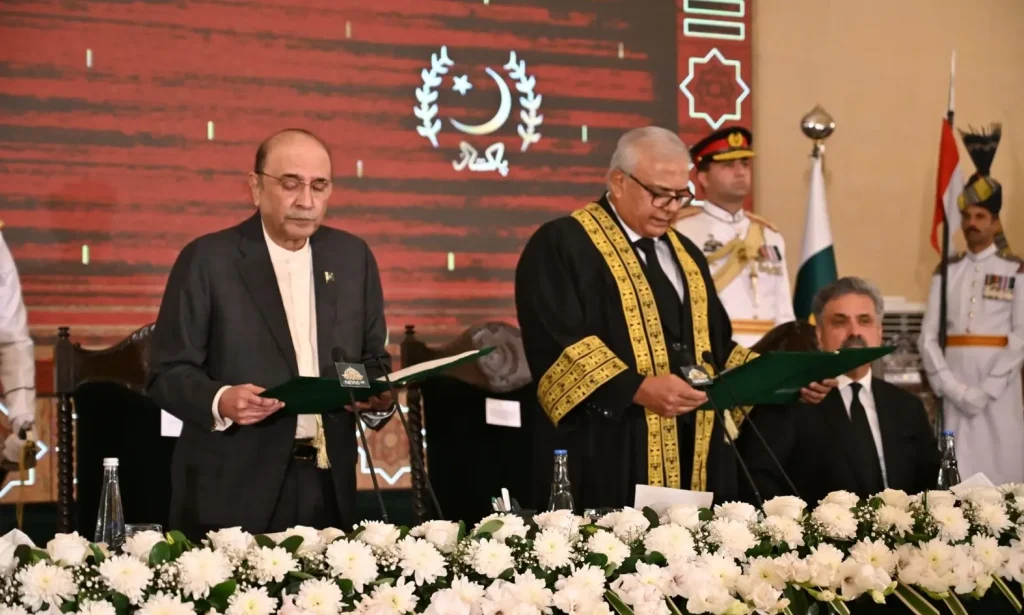Pakistan Establishes Federal Constitutional Court After 27th Amendment, marking a historic shift in the country’s judicial structure as the government set up the first ever Federal Constitutional Court with Justice Aminuddin Khan appointed as its inaugural chief justice. Pakistan Establishes Federal Constitutional Court After 27th Amendment reflects the major constitutional and institutional changes that have reshaped the powers of the Supreme Court and introduced a new judicial forum for constitutional matters.
Following the passage of the 27th Constitutional Amendment, Justice Aminuddin Khan, a seasoned jurist who served six years on the Supreme Court and earlier led the constitutional bench under the 26th Amendment, has taken charge as the head of the new court. His judicial career spans decades, from becoming a high court lawyer in 1987 to serving at the Lahore High Court from 2011 to 2019, and later hearing major constitutional and May 9 related cases as part of the Supreme Court. His bench notably approved review petitions that restored the Peshawar High Court’s decision on PTI reserved seats after questioning whether the Supreme Court had jurisdiction to override the PHC ruling.
Alongside Justice Aminuddin, six other judges have been notified, including three serving Supreme Court judges and justices from the Balochistan, Sindh, and Peshawar High Courts. The Federal Constitutional Court will now hear constitutional cases involving the state, handle appeals against high court decisions in tax and revenue matters, and even take up suo motu notices. All constitutional cases pending in the Supreme Court will now shift to the newly established FCC.
Legal experts and the bar community have long argued that the FCC was needed to reduce the Supreme Court’s heavy workload, especially political cases that piled up over the last 18 years. Supreme Court Bar Association President Haroon Rashid said the new court will allow ordinary citizens faster access to justice while reducing delays caused by political litigation. He also criticised past judicial appointments made through personal connections and said that despite some opposition from lawyers, most of the legal community supports the reform.
However, the amendment has sparked intense debate. Several legal experts believe the Supreme Court’s powers have been significantly curtailed. Barrister Salahuddin said most of the court’s authority has now shifted to the FCC, leaving the Supreme Court as a symbolic entity. Former judge Faisal Arab argued that the 27th Amendment alters the Constitution’s basic structure and transforms the Supreme Court into a regular judicial body rather than the apex court. He noted that challenges to the amendment will now be heard only by the FCC, raising concerns about judges reviewing cases involving their own institution.
The strongest reaction came from the judiciary itself. Senior Supreme Court judges Justice Mansoor Ali Shah and Justice Athar Minallah resigned, calling the 27th Amendment a “serious attack on the Constitution” that undermines judicial independence and subordinates the apex court to the government. Their resignations triggered a wave of responses across the legal and civil society spectrum. Lawyer Makhdoom Ali Khan also resigned from the Law and Justice Commission, arguing that meaningful reform is impossible without judicial independence.
Reactions from the public and legal community reflect deep divisions. Some praised the judges for standing by their principles, arguing that their resignations represent hope for constitutional integrity. Others questioned their timing, highlighting previous judicial decisions while saying the judiciary is now facing the consequences of its own actions over the years.
As Pakistan enters a new judicial era, the establishment of the Federal Constitutional Court has become one of the most consequential outcomes of the 27th Constitutional Amendment. Supporters see it as long overdue judicial reform, while critics fear it is a step that weakens the Supreme Court’s authority. Either way, the FCC is set to redefine constitutional adjudication in the country.


